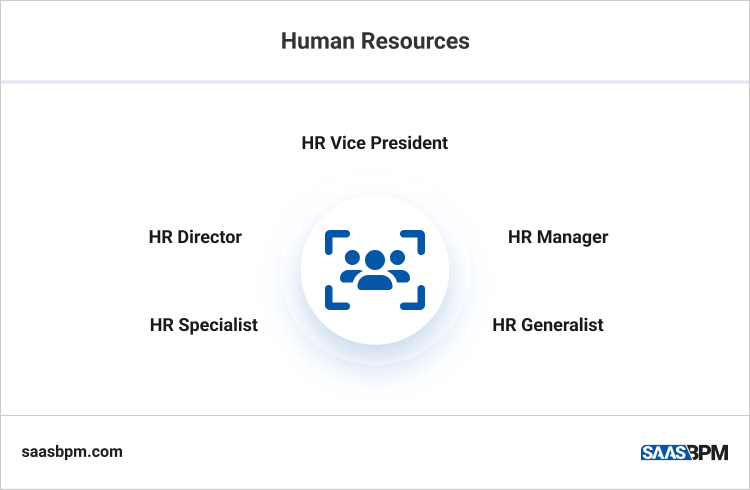Human resources play a crucial role in an organization as they deal with the most valuable asset: its people. The HR department in a business is responsible for various functions, ensuring compliance with labor laws, fostering a positive work environment, and supporting employee growth and development. Within HR, there are several key roles, each contributing to the overall success of the business.
Integrating a business process management software like SaaS BPM into your organization can empower your HR team to streamline their tasks and make more informed decisions. A BPM product offers a centralized platform with a transparent and easy-to-manage dashboard, enabling HR professionals to seamlessly navigate between job descriptions, candidate information, and onboarding processes.
This is quite important as employees that go through a structured onboarding process are 58% more likely to stay in the company for at least 3 years.
By leveraging features such as onboarding support and intuitive candidate sifting, your HR team can enhance the employee experience while optimizing workflows and fostering collaboration.
In this article, we will describe five key HR roles that SMEs as well as big corporations usually have in their teams.

HR Generalist
An HR Generalist serves as a versatile and foundational role within the HR department, responsible for a wide range of human resource activities. Their primary responsibilities include managing recruitment processes, administering employee benefits, handling employee relations issues, and ensuring compliance with relevant labor laws and regulations.
To excel as an HR Generalist, individuals must possess strong communication, interpersonal, and organizational skills. They should be detail-oriented, capable of multitasking, and adept at problem-solving. Additionally, proficiency in HR software and knowledge of employment laws are essential for success in this role.
The HR Generalist would be the one organizing the recruitment process for a new job opening. This involves drafting job descriptions, posting job advertisements on various platforms, screening resumes, coordinating interviews, conducting background checks, and extending job offers to successful candidates. Throughout this process, the HR Generalist acts as a liaison between hiring managers and candidates, ensuring a smooth and efficient recruitment experience for all parties involved.
HR Specialist
An HR Specialist is a specialized role within the HR department, focusing on a specific area of human resources such as recruitment, training and development, compensation and benefits, or employee relations. Their main responsibilities revolve around providing expertise and support in their specialized area, ensuring compliance with relevant laws and regulations, and implementing HR programs and initiatives.
To excel as an HR Specialist, individuals must possess in-depth knowledge and expertise in their specific area of focus. They should have a thorough understanding of relevant laws and regulations, as well as best practices within their field. Strong analytical, problem-solving, and communication skills are also essential for success in this role.
For example, a recruitment specialist might be responsible for developing recruitment strategies, sourcing candidates through various channels, conducting interviews, and negotiating job offers. They may also be tasked with analyzing recruitment metrics to assess the effectiveness of recruitment efforts and identify areas for improvement.

Similarly, a training and development specialist might design and deliver training programs to enhance employee skills and performance, conduct training needs assessments, and evaluate the effectiveness of training initiatives. They may also collaborate with department managers to identify training gaps and develop tailored training plans to address specific needs within the organization.
HR Manager
An HR Manager is a key leadership role within the HR department, responsible for overseeing the day-to-day operations and strategic direction of the HR function. Their primary responsibilities include developing and implementing HR policies and procedures, managing HR programs and initiatives, and ensuring compliance with employment laws and regulations.
An HR Manager must possess strong leadership, communication, and interpersonal skills. They should have a deep understanding of HR best practices, employment laws, and industry trends. Strong problem-solving and decision-making skills are as well essential for effectively managing HR operations and resolving complex employee issues.
An example of a typical task or scenario an HR Manager might handle is leading the performance management process within the organization. This involves setting performance goals and expectations, conducting performance reviews, providing feedback and coaching to employees, and addressing performance issues as needed. The HR Manager plays a critical role in ensuring that performance management processes are fair, consistent, and aligned with organizational goals.
Also, HR Managers oversee recruitment and hiring processes, managing employee relations and conflict resolution, administering employee benefits programs, and facilitating employee development and training initiatives. They serve as a trusted resource for employees and management alike, providing guidance and support on a wide range of HR-related matters.
HR Director
An HR Director is a senior leadership position within the HR department, responsible for setting strategic direction and overseeing all HR functions within an organization. Their primary responsibilities include developing HR strategies and initiatives that support organizational goals, managing HR budgets and resources, and providing leadership and guidance to HR staff.
HR Directors need to be equipped with good strategic planning and decision-making skills. Additionally, effective communication and interpersonal skills are essential for building relationships with senior management and collaborating across departments.
For instance, an HR Director would be responsible for the implementation of a new HRIS (Human Resources Information System) within the organization. This involves conducting needs assessments, selecting appropriate software vendors, overseeing system implementation and training, and ensuring that the new system meets the organization’s needs and objectives. The HR Director plays a critical role in driving the successful adoption and utilization of HR technology solutions to streamline HR processes and improve efficiency.
In addition to HRIS implementation, HR Directors are also responsible for developing and implementing HR policies and procedures, managing employee relations and conflict resolution at a strategic level, and providing guidance and support on complex HR issues. They work closely with executive leadership to align HR strategies with organizational goals and drive initiatives that support overall business success.
HR Vice President
An HR Vice President holds a senior executive position within the HR department, typically reporting directly to the Chief Human Resources Officer (CHRO) or Chief Executive Officer (CEO). Their primary responsibilities include developing and implementing HR strategies that align with organizational goals, overseeing all HR functions, and providing leadership and direction to the HR team.
An HR Vice President would be the person leading a company-wide diversity and inclusion initiative. This involves developing a comprehensive diversity and inclusion strategy, establishing goals and metrics to measure progress, and implementing programs and initiatives to promote diversity and foster an inclusive work environment.
In addition to diversity and inclusion initiatives, HR Vice Presidents are also responsible for overseeing talent management, succession planning, executive compensation, and employee engagement strategies. They work closely with executive leadership to align HR strategies with business objectives and drive initiatives that support overall organizational success.
Conclusion

In summary, the HR department comprises several critical roles, including HR Generalists, Specialists, Managers, Directors, and Vice Presidents, each with distinct responsibilities contributing to organizational success. Understanding and leveraging these roles is essential for building a strong and effective HR team capable of supporting the organization’s goals and objectives. Furthermore, the dynamic and evolving nature of HR roles underscores the need for continuous learning and adaptation to meet the changing needs of today’s organizations and workforce. By embracing innovation and staying abreast of industry trends, HR professionals can drive positive change and enhance organizational performance.

